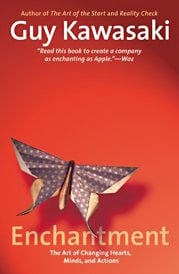This article is more than 1 year old
Apple ex-evangelist Kawasaki pans, praises Jobs
'Apple's existence proves there is a god'
Apple fanboys may have religious fervor, but so too does its ex–chief evangelist Guy Kawasaki, who reckons that Apple's continued existence is evidence that there must be a God.
Keynoting at The Founder Conference in Mountain View, California, just up the road from Apple's HQ, Kawasaki laid into his former employer, joking about battery life, lack of a keypad, and dreadful data contracts that Apple customers have long grown used to with their iPhones and iPads.
He also tracked back to the 1980s, claiming that the only reason the Mac – and therefore Apple – survived was Aldus Pagemaker. That great piece of desktop publishing software enabled the Mac to find a market with publishers, and thus to survive – survive, that is, because the Mac was hopeless at what computer systems were most needed for at the time: spreadsheets and databases.
That same poor functionality in iPhones could (should?) have caused the demise of Apple 20 years later, he said, but instead it has become one of the world's largest computer companies. "I believe in God, I do," Kawasaki told attendees, "because if there were no God, Apple could not have survived."

Kawasaki's tenth book: Enchantment
In fact, Kawasaki – who is pushing his book about how to create a successful product by "enchanting" customers – has an answer for why Apple is going from strength to strength.
"Steve Jobs doesn't get on stage and say 'Here are $188 of parts, now just sign up to two years of the worst data contract in the world and you can have it'," Kawasaki said. "What he does is he sells a dream – he tells you about the wonderful, positive things you are going to do with it."
And selling that dream is part of what Kawasaki's Enchantment: The Art of Changing Hearts, Minds and Actions is all about. In his entertaining keynote, Kawasaki outlined a few of his rules for enchanting people – and also gave a quick masterclass in presenting.
You need to look outside the "A-List" of media and bloggers, and instead "plant many seeds," according to the Kawasaki. That means reaching people with 50 Twitter followers who you will never meet and never know. And you do that by engaging with as many people as possible as quickly and frequently as you can.
Highlighting the Jobs approach, Kawasaki suggests that you enchant people by talking about the number of songs your product can hold, rather than its gigabytes of storage capacity, or the months of food that your nonprofit has supplied, not the dollars it has raised.
Other tips include ways to overcome resistance to a new product – "and the more innovative it is, the most resistance you will face," he said. Examples include focusing on what Kawasaki call the "bright spot." In Apple's case, Pagemaker was the bright spot that gave the Mac entry into a market that helped it survive.
Kawasaki cited the Grateful Dead's policy of encouraging "tapers" – usually known as bootleggers – at its concerts as one reason for the enduring appeal and sales of the band. Contrast the Dead's laissez-faire policy, Kawasaki said, with the RIAA's approach of "suing old ladies for downloading cello music from Napster."
Tips for "enchanting up" – also called kissing ass – include dropping everything else when your boss asks for something, providing a fast first draft, and delivering bad news early. Presentation tips include using no more than 10 slides in 20 minutes in a 30-point font.
But perhaps most interesting of all was Kawasaki's plea to watch Justin Bieber's film Never Say Never.
"You will never learn more about marketing than watching that movie," he claimed. "Go rent it. And I will personally refund your money if you don't find it useful." ®
